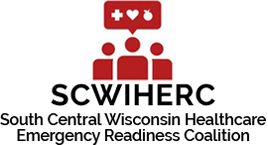The Assistant Secretary for Preparedness and Response prescribes that all healthcare coalitions should have engagement from four essential disciplines: hospitals, public health, emergency management, and emergency medical services. We also have strong involvement from trauma thanks to the state and regional trauma advisory councils. As our coalitions continue to grow and develop, we also seek to engage additional partners from clinics, long-term care, surgery centers, mental and behavioral health providers, hospice providers, home health providers, dialysis centers, fire and rescue, law enforcement, community and faith based organizations, volunteer organizations, human services, medical examiners and coroners, schools and universities, transportation companies, retailers and others.
To Join SCWIHERC, participate in one of our upcoming meetings, trainings, or exercises. Use the contact form to subscribe to our mailing list. Contact Jennifer Behnke with any questions.
What is a HERC?
A healthcare emergency readiness coalition (HERC) is comprised of a core group of hospitals and healthcare organizations, local and tribal public health agencies, state, regional, and local and tribal emergency management, and emergency medical services, as well as additional members. These partners collaborate for the common goal of making their communities safer, healthier, and more resilient. Wisconsin has seven regional HERCs that support communities before, during, and after disasters and other health-related crises.
The U.S. Department of Health and Human Services (HHS) Office of the Assistant Secretary for Preparedness and Response (ASPR) Hospital Preparedness Program (HPP) funds Wisconsin’s HERCs. ASPR leads the country in preparing for, responding to, and recovering from the adverse health effects of emergencies and disasters. ASPR’s Hospital Preparedness Program (HPP) enables the health care delivery system to save lives during emergencies and disaster events that exceed the day-to-day capacity and capability of existing health and emergency response systems.
HPP is the only source of federal funding for health care delivery system readiness, intended to improve patient outcomes, minimize the need for federal and supplemental state resources during emergencies, and enable rapid recovery. HPP prepares the health care delivery system to save lives through the development of health care coalitions (HCCs). In Wisconsin, these are known as healthcare emergency readiness coalitions (HERCs).
The overall goal of the HERC is to help Wisconsin communities prepare for, respond to, and recover from a disaster as quickly as possible. Through coordinated preparation, response, and recovery efforts, HERC members work to create a more resilient Wisconsin.
Benefits of HERC Membership
- Public Health: Local and tribal public health agencies benefit from HERC membership by collaborating through planning, training and exercising to meet preparedness grant objectives and accreditation requirements. HERCs also provide coordination, support, and resource management during public health related emergencies.
- Emergency Medical Services (EMS): EMS agencies benefit from HERC membership by participating in HERC-supported training and exercise opportunities, including those related to responder safety and health.
- Hospitals: Hospitals benefit from HERC membership through technology advancements, enhanced communication for situational awareness, information sharing during actual events, and overall incident coordination, support, and resource management.
- Emergency Management: Local, tribal, and regional emergency management benefits from HERC membership through collaboration and support of medical and health needs during an incident or disaster.
- Additional Members: Providers that are part of the continuum of the healthcare delivery system, including skilled nursing facilities, pharmacies, blood banks, dialysis centers, among others, benefit from HERC membership by play a vital role in ensuring healthcare delivery in the time of a disaster.
HERC core and additional members are diverse and have unique missions, visions, goals and resources. During times of disaster, minimizing harm, rapidly surging resources, and shortening the length of the incident (Community Recovery) benefits the entire community. It is for these reasons that HERC members come together as a comprehensive network to plan, train, exercise, respond, and recover.
